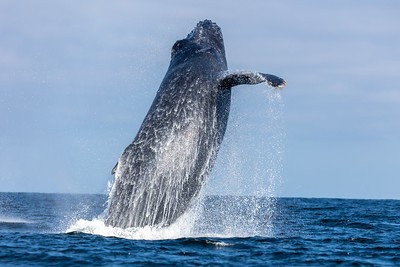Contrary to the claims made by some politicians, extensive research reveals that offshore wind farms do not pose a threat to whales, challenging the narrative surrounding their environmental impact."

In recent months, the fight over the future of renewable energy has commanded a great deal of attention. Former President Donald Trump, has made claims suggesting that the construction of offshore wind turbines is the contributing factor in the harm and death of these giant animals. However, scientists say there is no credible evidence linking the offshore wind farms to whale deaths. According to the Associated Press the dispute emerged after 2016, when an unusually high number of whales were discovered dead or stranded along New England beaches. These incidents highlight the ongoing contentions between Republican politicians and advocate groups for protecting whales.
Currently, there are two commercial offshore wind farms under construction in the United States. Danish wind energy developer Ørsted and the utility Eversource are building South Fork Wind, located 35 miles east of Montauk Point, New York. On Dec. 7, Ørsted announced that the first of its 12 turbines there is now sending electricity onto the grid. Vineyard Wind is building a 62-turbine wind farm 15 miles off Massachusetts. Both plan to open sometime this year, while other large offshore wind projects continue to procure permits. The U.S. also has two pilot projects that include five turbines off Rhode Island and two off Virginia. The Associated Press reported the Biden administration aims to power 10 million homes with offshore wind by 2030-- emphasizing a key piece of its climate objectives.
DO U.S. WIND FARMS PLAY A ROLE IN CONTRIBUTING TO WHALE DEATHS?
Experts at both federal organizations and environmental advocacy groups say there is no proof of a connection between offshore wind farms and recent whale beachings. In an email to USA TODAY, Marine Mammal Commission spokesperson Brady O'Donnell reiterated that there is "no evidence linking site preparation work for offshore wind farms with a number of whale deaths along the U.S. East Coast". Nonetheless, 23 whales have died on the East Coast since December 2022. Researchers at the National Oceans and Atmospheric Association have stated that this is a peculiar mortality rate for humpback whales.
NOAA Fisheries spokesperson, Lauren Gaches said "no whale mortality has been attributed to offshore wind activities," in a press conference last January. Since scientists began looking into the phenomenon, post-mortem examinations show that 40% of the 178 humpback whales that died since 2016 had evidence of human interaction, such as ship strikes or entanglements. Gaches also pointed out that at least two of the whales that washed up on the East Coast in recent months were most likely hit by boats. The others could not be linked to a specific cause.
U.S. scientists continue to collect data near offshore wind farms to monitor any potential impact on the mammals, including altered behavior or changes to migration routes. Doug Nowacek, a marine biologist at Duke University, notes that this research is still in its preliminary stages. Federal authorities and scientists noted the biggest threats to whales are shipping collisions and entanglement in fishing gear. There is also a concern for underwater noise pollution.
WHY ARE POLITICAL GROUPS ALLEGING WIND FARMS CAUSE WHALE DEATHS?
To try and stop projects, some within the Republican party were able to get the U.S. Government Accountability Office to open an investigation into the offshore wind industry's impacts on commercial fishing and marine life and requested a moratorium on the projects. David Hardy, group Executive Vice President and CEO of Americas at Ørsted believes these claims are "not scientific" but "very much politically-driven misinformation." Conservative public policy group, The Heartland Institute has also pushed back at offshore wind projects. Director of the Arthur B. Robinson Center on Climate and Environmental Policy, H. Sterling Burnett, indicated the wind projects are subject to unfairly lax regulatory restrictions compared to fossil fuel ventures.
However, smaller anti-wind groups have organized within their coastal communities to oppose projects they feel jeopardize their lifestyle.
Whale advocates continue to push for renewable energy as they say climate change is harming the animals and reduced dependency on fossil fuels would help solve that problem.
© 2025 HNGN, All rights reserved. Do not reproduce without permission.









